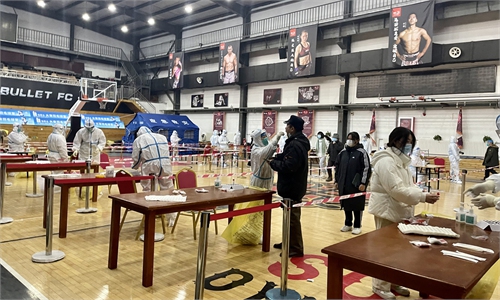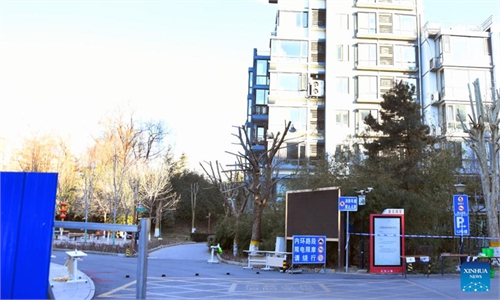
Yue Yuetong Photo: A screenshot from Sina Weibo
Chinese netizens across the country on Thursday were helping a migrant worker in Beijng, also an asymptomatic virus carrier who has been called "the man living the most arduous life in China," find his missing son. His tough daily working schedule of bouncing around some 30 places in the Chinese capital to carry construction materials till midnight, which was revealed by an epidemiological investigation, deeply touched people's hearts.
The man surnamed Yue was identified as an asymptomatic carrier after he took a nucleic acid test on Monday, the day before his train to Weihai, East China's Shandong Province. He was transferred on Tuesday to a designated hospital for treatment.
He lives in Beijing's Chaoyang district and works day and night at different construction sites in multiple districts across the city. Even on New Year's Day, he worked till 4 am.
Yue told the China Newsweek that he worked part time in different cities to search for clues of his missing son. His elderly son went missing on August 12, 2020, and Yue came to Beijing from his hometown in Shandong as his missing son had worked in kitchens in Beijing.
Shandong provincial public security department attaches great importance to the case and urged the Weihai police to speed up investigation, the Legal Daily reported on Thursday.
Yue's epidemiological survey went viral after health authorities released the details of his schedule. Many netizens commented that it was the saddest epidemiological survey that has ever been released and saying they felt so grateful to hardworking migrant workers like Yue as they contributed to the construction of megacities. Netizens on Thursday also created a topic on Weibo, titled "finding Yue Yuetong with the help of the Chinese internet." Yue Yuetong is the name of his missing son. The message was widely circulated on various social media platforms.
An epidemiological survey is a tool used to understand how a patient was infected and whether they have transmitted the virus to others. It's significant in making China's efforts more effective in preventing and controlling the virus.
Amid an outpouring sympathy for Yue, he he told China Newsweek, "I don't think I am pitiful. I just work, I don't steal, I don't rob, I use my own strength, I make a living with my own hands. I earn some money to help find my son. I am just making a living to take care of my family."
Yue is one of the 21 million residents living in Beijing and one of China's nearly 286 million migrant workers. Most of these workers make a living in service industries like catering and retailing and the construction industry.
Zhu Wei, vice director of the Communication Law Research Center at the China University of Political Science and Law, told the Global Times on Thursday that Yue's life reflects Chinese people's hardworking, diligence and dignity. Big cities like Beijing have many such workers who provide services to many people like housekeeping, delivery as well as building the city's infrastructure, he added.



